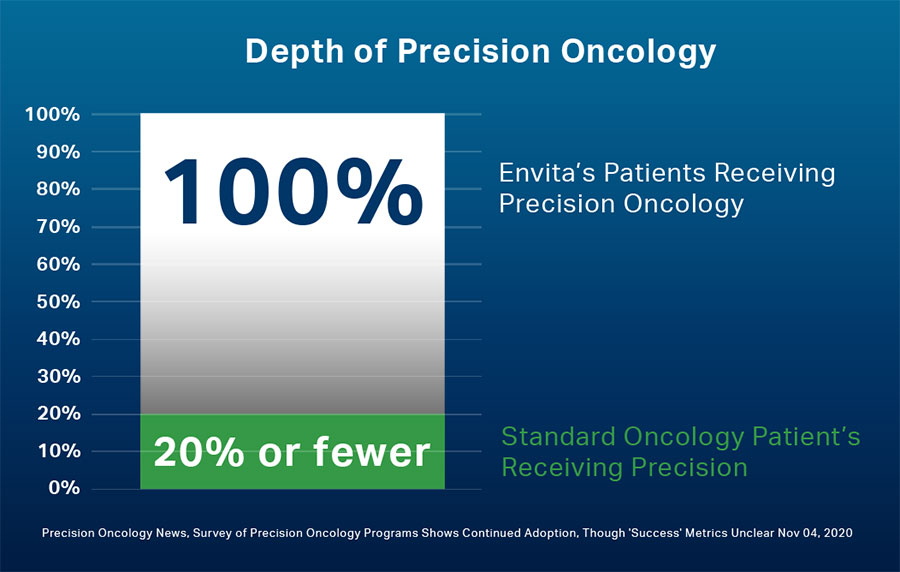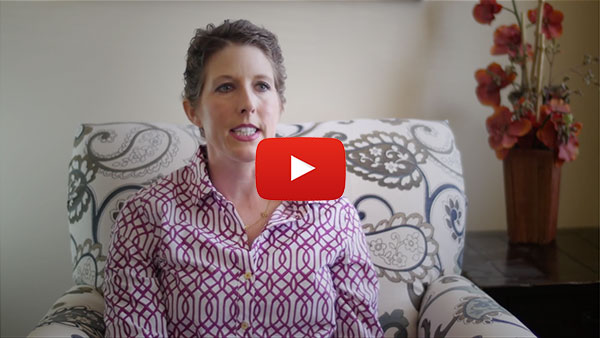How Insurance-Based Care Is Failing Breast Cancer Patients in the United States

Breast cancer patients often live with fear of a recurrence, despite early intervention and treatment in many cases. The standard chemotherapy, radiation, surgery, and hormone therapy offered as part of insurance-based care is failing as many breast cancer patients experience cancer recurrence or spread to different organs, called metastasis. According to medical research, breast cancer mortality is largely related to either drug resistance or metastasis.* Breast cancer remains the second leading cause of cancer related deaths in women in the United States.

To reduce mortalities and improve quality of life, breast cancer patients need precision-targeted and personalized care that goes beyond the limits of insurance-based care. Precision care customizes a treatment regimen based on an accurate assessment of the risk of recurrence or progression of an individual's breast cancer. According to a study published in the International Journal of Breast Cancer, precision medicine provides every individual breast cancer patient with the most appropriate diagnostics and therapies based on their specific cancer's genetic profile.*
* Harris EER. Precision Medicine for Breast Cancer: The Paths to Truly Individualized Diagnosis and Treatment. Int J Breast Cancer. 2018;2018:4809183. Published 2018 May 9. doi:10.1155/2018/4809183
Envita Medical Centers, a Center of Excellence for Precision Oncology, has been specializing in this approach for the past 25 years. Precision oncology is derived from creating customized treatment regimens for patients based on their individualized genomic needs, only then can a patient receive a true precision approach to care. Unfortunately, precision oncology is out of reach for the majority of patients pursuing insurance covered care.

The customization needed for true precision care is not offered within insurance-based care because insurance-based care is driven by standardized protocols developed to treat the majority of patients, not the individual. Though cancer technology is rapidly advancing, insurance coverage is slow to change with technological advancements. Because insurance is the limiting factor that controls the treatment options patients have access to, most patients are not aware of these limitations when pursuing insurance-based care until they find themselves in a difficult situation, fighting for their life while treating a cancer that isn't responding to care.
Why is the Insurance Model Failing Breast Cancer Patients?
The insurance model is driven by the NCCN (National Comprehensive Cancer Network) guidelines which have set treatment protocols based on cancer type and stage. The treatment protocols have designated CPT (Current Procedural Terminology) codes which are numerical codes used to identify medical services and procedures offered by network hospitals and doctors. Hospitals and doctors can only bill insurance companies for standard treatments which have designated CPT codes. This is where the problem lies with insurance-based care.
This process of billing based on CPT codes does not provide the flexibility needed to customize a treatment regimen to target your specific breast cancer mutations. The lack of precision-targeting for your specific biomarkers can lead to treatment failure as well as breast cancer recurrence and metastases.
If you thought health insurance was your only way to get financial support for breast cancer treatment, think again. You have other options offering you the flexibility of customizing the treatment needed to target your specific breast cancer cell mutations.
Types of Financial Support in Breast Cancer Care
Health Insurance
You pay a monthly premium to the health insurance company so when you need medical help, the health insurance company will cover a percentage of the cost, provided you seek care from hospitals/doctors in its network. Insurance companies negotiate a deal with their network hospitals and take an administration fee of 10 to 15 percent of the total cost to care of each patient. Depending on your premium and type of plan, the health insurance company may cover 60 to 100 percent of your cost. In employer- sponsored health insurance policies, employers split the cost of premiums for employees and their dependents.
Pros
Good for standard care.
Cons
May not support personalized, precision treatment.
ECEN (Employers Centers of Excellence Network)
The ECEN provides employees access to high-quality care at selected Centers of Excellence (CoE) for certain specialties like oncology. The term CoE is used to describe facilities with the highest level of quality, service, leadership, and best practices in their field. The ECEN qualifies facilities based on their volume, quality, and outcome data. Through the ECEN program, generally a bundled payment is negotiated between the employers and the CoE. The employees usually have little to no out-of-pocket costs.
Pros
Perfect for personalized care.
No middleman involved, as deals are decided between the employers and the Center of Excellence.
Cons
It's a relatively new program, so not many employers offer it yet.
Health-share Plans
Health-share plans are like cooperatives, with members agreeing to cover a certain portion of each other's medical costs. Since health-share plans have much fewer members, as compared to health insurance, these cooperatives have less ability to lower costs through negotiated discounts.
Pros
Ideal for precision and personalized care.
Certain health-share plans give you the freedom to go where you want, without network limitations.
Cons
Health-share cooperatives make their own rules so they may not cover cancer treatment at the facilities or doctors you want to visit.
Precision Targets Lead to Personalized Medicine
Regardless of what type of financial support method you use for your care, precision is needed at every stage of your breast cancer treatment, right from detection and diagnosis, to surgery, systemic therapy, and follow up care. Precision oncology care begins in the detection and diagnosis phase and Envita has developed sophisticated algorithms in advanced genomics to identify treatment targets that are commonly ignored in conventional care.
Envita Precision Algorithm vs.
Standard Oncology Precision Testing
-
Envita Medical Centers
-
Standard Oncology
Precision Testing - RNA Transcriptome Genes
- Envita Medical Centers: 20,000+
-
Standard Oncology:
Unchecked
- SNV/CNV Genes
- Envita Medical Centers: 452
- Standard Oncology: 309
- Rearrangements/Fusion Genes
- Envita Medical Centers: 51
- Standard Oncology: 27
- Microsatellite Instability (MSI)
-
Envita Medical Centers:
Checked
-
Standard Oncology:
Checked
- Tumor Mutation Burden (TMB)
-
Envita Medical Centers:
Checked
-
Standard Oncology:
Checked
- BRCA 1/2
-
Envita Medical Centers:
Checked
-
Standard Oncology:
Checked
- Immunohistochemistry
-
Envita Medical Centers:
Checked
-
Standard Oncology:
Unchecked
- Chemosensitivity
-
Envita Medical Centers:
Checked
-
Standard Oncology:
Unchecked
- Concurrent Liquid Biopsy
-
Envita Medical Centers:
Checked
-
Standard Oncology:
Unchecked
- Exosomal miRNA Analysis
-
Envita Medical Centers:
Checked
-
Standard Oncology:
Unchecked
- Circulating Tumor Cells Enumeration
-
Envita Medical Centers:
Checked
-
Standard Oncology:
Unchecked
- Pharmacogenomics
-
Envita Medical Centers:
Checked
-
Standard Oncology:
Unchecked
- Individualized Therapy Recommendation
-
Envita Medical Centers:
Checked
-
Standard Oncology:
Unchecked
- CarcinogenicExposure - Root Causes
-
Envita Medical Centers:
Checked
-
Standard Oncology:
Unchecked
- Inflammation Markers
-
Envita Medical Centers:
Checked
-
Standard Oncology:
Unchecked
- Metabolic Target Drivers
-
Envita Medical Centers:
Checked
-
Standard Oncology:
Unchecked
*Individual results may vary. Envita makes no guarantees for outcomes.
Standard cancer genetic tests analyze about 500 biomarkers. These results are referenced against cancer treatment options that are commonly available to patients. Envita's proprietary genomic testing looks at 20,000+ biomarkers, millions of analytes, and molecular profiles to determine which treatments, beyond standardized options, can be beneficial for your disease. From this in-depth genomic analysis, compounds are custom developed at Envita's in-house pharmacy based on your unique genomic information providing care that is designed for your needs, giving you an edge over breast cancer.
How Other Modes of Financial Support May Help
Since most cancer care hospitals operate within the health insurance model, they don't have the liberty to go beyond standard care and customize a treatment regimen for your specific breast cancer. Envita Medical Centers is not limited by the health insurance model, so the expert team including oncologists, interventional radiologists, and researchers design a medical blueprint, customized specifically for your breast cancer biomarkers.
Though insurance does not have the scope to cover customized treatments, patients may use 3rd party billers to claim some out-of-network reimbursements. The percentage of reimbursement depends on your insurance plan and type. If it's an employer-supported health insurance plan, then your reimbursements may be more than a personal health insurance plan. Patients can also use a personal death benefit from life insurance if they choose that option. Since cancer is considered life threatening, most life insurance policies allow for access to treatment.
The ECEN is a good financial support option for breast cancer. Many employers are now looking forward to collaborating with CoEs so they can offer specialized care to their employees, reducing recurrent health care costs. In fact, the findings of a 2020 Health Care Delivery Survey reveal, nearly three-quarters of employers (73 percent) intend to adopt and expand different types of health care delivery models, such as CoE.*

* Willis Towers Watson. (2020, October 16). 2020 Health Care Delivery Survey. Retrieved from https://www.willistowerswatson.com/en-US/Insights/2020/10/2020-health-care-delivery-survey
Corporations have been joining Envita Medical Centers' Center of Excellence for Precision Oncology program to offer their employees advanced care at a fraction of the cost, based on 3rd party actuarial data. Employers can join the program at no cost to provide precision targeted cancer benefits for employees. In such collaborations, the employers pay only for the cost of care they agree to. There are no hidden charges. Also, Envita uses a value-based model meaning that a portion of the cost is withheld until Envita can show benefit metrics for the patient. This is the only oncology withhold in the industry, indicating Envita's confidence in its work.
Health-share plans are also a viable option for financial aid in breast cancer treatment. Certain health-share plans have teamed up with Envita, so if their members need personalized cancer care they agree to cover some percentage of the cost of treatment.
Take a Tour of Envita Medical Centers

Envita Medical Centers' expert team including researchers, oncologists, interventional radiologists, and pharmacists who have been working on precision oncology care for over 25 years. This well-knit team focuses on attacking your breast cancer from all angles to minimize instances of recurrence or metastases. For any of your breast cancer related queries please call our Patient Care Experts at 866-830-4576.




















